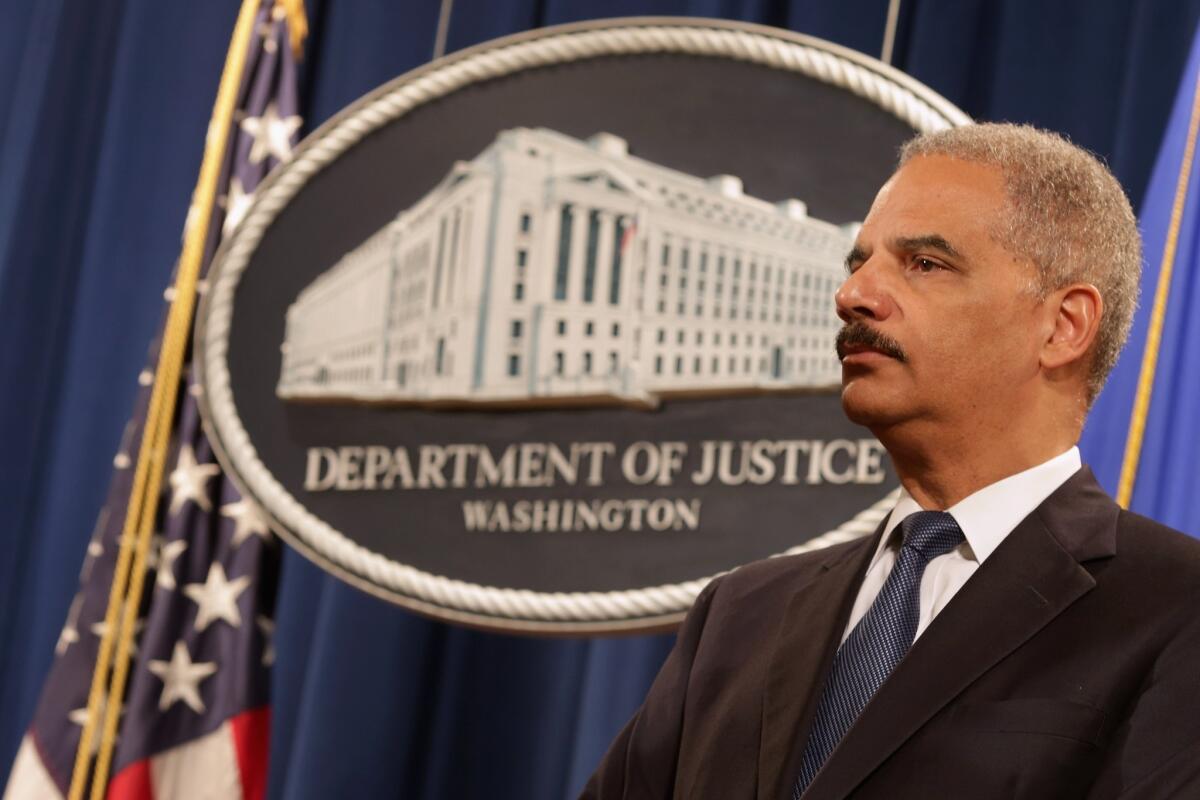Eric Holder to grads: Biggest civil rights issue not ‘hateful rants’

- Share via
Indirectly referencing Clippers owner Donald Sterling and Nevada rancher Cliven Bundy, U.S. Atty. Gen. Eric Holder said that “hateful rants” and “intolerant public statements” that have filled recent headlines are not the most pressing issue in the ongoing fight for equal opportunity.
Instead, in a commencement address Saturday, Holder challenged 850 graduates at Baltimore’s Morgan State University to fight against disciplinary, voting and other policies that quietly and gradually harm minorities.
“This is the work that truly matters – because policies that disenfranchise specific groups are more pernicious than hateful rants,” Holder said, according to prepared remarks. “Proposals that feed uncertainty, question the desire of a people to work, and relegate particular Americans to economic despair are more malignant than intolerant public statements, no matter how many eyebrows the outbursts might raise.”
He cited the criminal courts as an example, referencing a federal study released last year that found black men and Native Americans endure prison sentences far longer than white men for similar crimes.
“A criminal justice system that treats groups of people differently – and punishes them unequally – has a much more negative impact than misguided words that we can reject out of hand,” he said.
The comments delivered Saturday on a school football field before seated graduates have been cast as Holder’s most significant remarks on race since early in his tenure when he derided Americans as “cowards” who segregated themselves on weekends, including by going to the “race-protected cocoons” known as malls.
On Saturday, he again said discussion about civil rights should not be something avoided. Holder didn’t mention Sterling or Bundy by name but instead cited “jarring reminders of the discrimination,” “outbursts of bigotry” and “isolated, repugnant, racist views” that have been in the news during the past few weeks and months.
The NBA has said Sterling was recorded telling a friend not to associate with black people. Bundy, a cattle rancher who has refused to recognize the federal government’s authority, recently told a reporter that blacks were perhaps better off as slaves than as poor people reliant on government subsidies today. After criticism nationwide, both white men said they were not racist.
Holder said swift condemnation and apologies were not enough.
“Because if we focus solely on these incidents – on outlandish statements that capture national attention and spark outrage on Facebook and Twitter – we are likely to miss the more hidden, and more troubling, reality behind the headlines,” Holder said.
“The greatest threats,” he said, “do not announce themselves in screaming headlines.”
Holder also pointed to school punishments as an example. Zero-tolerance policies affect black children at a rate three times higher than white students, he said. Another example: Laws that limit access to voting also affect minorities more than white people. He expressed frustration that Americans were fighting for people in Afghanistan to vote while making it harder for people to vote within the U.S.
These policies that stand in the way of equal opportunity cause a “terrible impact” that “endures long after the headlines have faded and obvious, ignorant expressions of hatred have been marginalized,” Holder said. The impact includes perpetuating cycles of “poverty, crime and incarceration that trap individuals, destroy communities and decimate minority neighborhoods.”
Holder also criticized Chief Justice John Roberts for his decision in a case that maintained Michigan’s ban on considering race in college admissions. Holder said giving less consideration to race was the exact opposite of what needed to happen. Open, and frank, discussion is needed, he said.
To take on this “critical work,” he told graduates that “wherever you go and whatever you do, you must find your own unique ways to contribute; to blaze a path for the next generation of Morgan graduates; and to keep challenging this nation to become even greater, even fairer, and even more committed to its founding ideals.”
He used himself as an example as he spoke on the 60th anniversary of the Brown vs. Board of Education decision at the U.S. Supreme Court. It brought black children and white children into the same classrooms.
“After all, 60 years and one day ago, schools and other public accommodations could legally refuse entry to men like my father,” Holder said. “Today, that devoted soldier’s son stands before you as the 82nd attorney general of the United States of America – proudly serving in the administration of the first African American president to lead this nation.
“That’s a powerful illustration of the greatness and possibility that is America – and the debt we owe to all who have dedicated their lives to building the more just and more perfect union that remains our common pursuit.”
More to Read
Sign up for Essential California
The most important California stories and recommendations in your inbox every morning.
You may occasionally receive promotional content from the Los Angeles Times.













